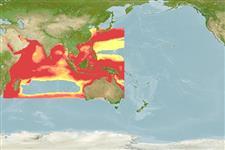Common names from other countries
>
Myctophiformes (Lanternfishes) >
Myctophidae (Lanternfishes) > Myctophinae
Etymology: Benthosema: Greek, benthos = depth of the sea + Greek, sema, sematos = signal, flag (Ref. 45335).
More on author: Alcock.
Environment: milieu / climate zone / depth range / distribution range
Ecologia
marinhas bentopelágico; intervalo de profundidade 10 - 300 m (Ref. 4066). Deep-water; 37°N - 33°S, 33°E - 154°E
Indo-West Pacific: From about 25°S off Mozambique to the Gulf of Oman, east to the Bay of Bengal, Indonesia and western Australia, and north to Japan. Southeast Atlantic: Larvae were present in cruise collections off the eastern coast of South Africa, however, adults have not been reported in this area (Ref. 41388).
Length at first maturity / Tamanho / Peso / Idade
Maturity: Lm 2.8, range 3 - 4.5 cm
Max length : 7.0 cm TL macho/indeterminado; (Ref. 9835)
Espinhos dorsais (total) : 0; Raios dorsais moles (total) : 13 - 14; Espinhos anais: 0; Raios anais moles: 17 - 22.
Benthopelagic and mesopelagic in slope and near continental and island waters (Ref. 9835, 11230). Found in 130-300 m during the day and in 10-200 m at night (Ref. 4066). Feeds in the evening (Ref. 9191). Feeds on mainly on copepods and various crustacean larvae. Lipid content is 4.6 % in fresh body weight (Ref. 8966).
Hulley, P.A., 1986. Myctophidae. p. 282-321. In M.M. Smith and P.C. Heemstra (eds.) Smiths' sea fishes. Springer-Verlag, Berlin. (Ref. 4066)
Categoria na Lista Vermelha da IUCN (Ref. 130435)
CITES (Ref. 128078)
Not Evaluated
Ameaça para o homem
Harmless
Utilização humana
Pescarias: pouco comercial
Ferramentas
Relatórios especiais
Descarregue XML
Fontes da internet
Estimates based on models
Preferred temperature (Ref.
115969): 16 - 28.1, mean 24.5 (based on 1123 cells).
Phylogenetic diversity index (Ref.
82804): PD
50 = 0.5312 [Uniqueness, from 0.5 = low to 2.0 = high].
Bayesian length-weight: a=0.00871 (0.00387 - 0.01962), b=3.11 (2.92 - 3.30), in cm Total Length, based on LWR estimates for this (Sub)family-body shape (Ref.
93245).
Nível Trófico (Ref.
69278): 3.1 ±0.27 se; based on food items.
Resiliência (Ref.
120179): Elevada, tempo mínimo de duplicação da população menor que 15 meses (K=1.81).
Fishing Vulnerability (Ref.
59153): Low vulnerability (10 of 100).
Climate Vulnerability (Ref.
125649): Moderate vulnerability (37 of 100).
